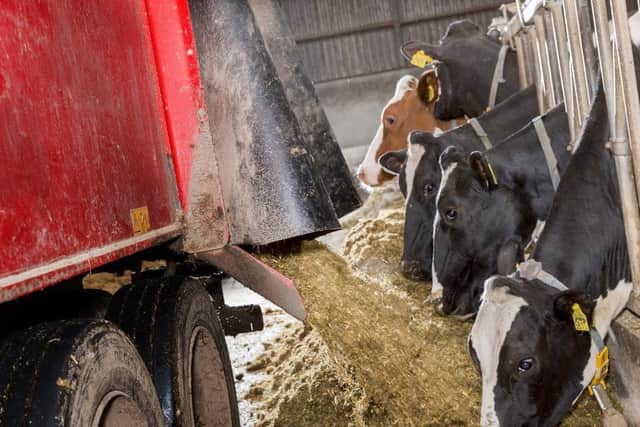Keep an eye out for Mycotoxin problems
and live on Freeview channel 276
This is causing reduced performance on many units. One of the many challenges of these types of silages can be mycotoxins.
Dairy diets are easily contaminated by mycotoxins. They may be present at moderate levels but feeding mycotoxins over an extended period can lead to chronic toxicity.
Advertisement
Advertisement
Traditionally, Fusarium mycotoxins such as deoxynivalenol (DON), zearalenone (ZEA) and T-2 toxin are known to cause problems.


More recently, new groups of mycotoxins, the so-called silage mycotoxins and other emerging mycotoxins are gaining importance.
The rumen micro-organisms can degrade or inactivate several mycotoxins but are not always able to deal with a mycotoxin challenge completely. If the rumen micro-flora is also affected by rumen acidosis and/or silage moulds with antimicrobial properties, detoxification capacity decreases.
Next to that, contamination of silage with typical silage mould favours secondary contamination with bacteria such as Clostridia and Listeria. Chronic exposure to moderate levels of different mycotoxins will therefore cause serious health issues.
Advertisement
Advertisement
There is some variation between the effects of different mycotoxins, but in general, they cause poor feed intake and poor rumen fermentation, resulting in a reduction of milk production.
They can also cause immune suppression, resulting in an increase of disease incidence and a further reduction of performance. Lastly, they can cause hormonal imbalances leading to poor fertility.
Of course, these symptoms can also be caused by many other diseases or management factors, hence it is not always easy to relate problems on a farm with mycotoxin contamination.
If mycotoxins are expected to be a problem, Trouw Nutrition have two products which can help.
Advertisement
Advertisement
Selko TOXO-XL is a mycotoxin mitigation product that contains bentonite, which has strong binding capacity for aflatoxins, ergot toxins and LPS, in combination with glucose biopolymers which maintain gut tight junctions to reduce the movement of mycotoxins into blood stream.
Selko TOXO-XL also contains purified β-glucans that improve the immune function of dairy cows. Selko TOXO-XL deals with all the potential negative effects of mycotoxins of dairy cattle, including those of mycotoxins that have recently emerged.
Heating is defined as an increase of 10 °C of the TMR above the ambient temperature. It is important to realise that significant growth of yeasts can already have occurred before this increase in temperature of the TMR is observed. Fresh TMR contain yeasts, moulds and bacteria, and growth of these micro-organisms leads to heating and fermentation, which reduces both the palatability and the feeding value of your TMR.
Selko-TMR is a blend of organic acids that reduces the growth of yeasts, moulds and bacteria such as Salmonella. As a result of the reduction in growth of micro-organisms, increases in temperature of the TMR are delayed.
Treating the TMR
Advertisement
Advertisement
The standard amount of Selko-TMR to be added to dairy feed is 1.5 litres of Selko-TMR per 1000 kg of TMR. Add 2 litres of Selko-TMR if the risk of fermentation and heating is high.
Treating the cutting edge of the silage
When a silage is sensitive for fermentation and heating at the cutting edge, the surface can be treated with Selko-TMR to slow down the fermentation. Spray 0.25 litre of Selko-TMR per square meter cutting surface.
Treating the top layer of the silage
If moulding of the top layer of the silage is a problem, Selko-TMR can be used at a dose of 0.5 litre of Selko-TMR per square meter.
For more information contact Adam Smyth on 07395790147.
About Trouw Nutrition:
Trouw Nutrition is committed to translating science into actionable, practical nutrition and farm management solutions to help customers produce quality meat, eggs and milk.